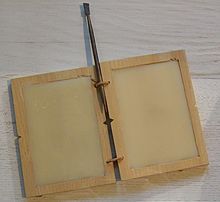Tabula rasa
Tabula rasa (Latin for "blank slate") is the idea of individuals being born empty of any built-in mental content, so that all knowledge comes from later perceptions or sensory experiences. This idea is the central view posited in the theory of knowledge known as empiricism. Empiricists disagree with the doctrines of innatism or rationalism, which hold that the mind is born already in possession of certain knowledge or rational capacity. Proponents typically form the extreme "nurture" side of the nature versus nurture debate, arguing that humans are born without any "natural" psychological traits and that all aspects of one's personality, social and emotional behaviour, knowledge, or sapience are afterwards imprinted by one's environment onto the mind as one would onto a wax tablet.

Quotes
edit- Tabula rasa.
- A clean tablet, one from which the writing has been erased. A blank sheet of paper. A clean slate.
- The mind, when unable to collect itself or remember any given circumstance, is termed metaphorically a tabula rasa in post-classical Latin, just as we say “a blank.” Among the Greeks the figure was common. Aristotle compares the mind to a “tablet on which nothing has been written,” ὥσπερ ἐν γραμματείῳ ᾧ μηθὲν ὑπάρχει ἐντελεχείᾳ γεγραμμένον (De Anima, 3, 4, 11); and Plutarch (Placita Philosophorum, 4, 11) speaks of the soul at birth, ὥσπερ χάρτης ἐνεργῶν εἰς ἀπογραφήν, as “so much paper ready for writing on.”
- Reported in: W. F. H. King, ed., Classical and Foreign Quotations, 3rd ed. (1904), no. 2674
- Have not we already disposed of the difficulty about interaction involving a common element, when we said that mind is in a sense potentially whatever is thinkable, though actually it is nothing until it has thought? What it thinks must be in it just as characters may be said to be on a writing-tablet on which as yet nothing actually stands written: this is exactly what happens with mind.
- What can we know? or what can we discerne?
When Error chokes the windowes of the minde,
The divers formes of things, how can we learne,
That have been ever from our birth-day blind?°- Sir John Davies, Nosce Teipsum (1599)
- ° Anima tanquam tabula, Aris[totle].
- All that seems to me to explain itself very clearly if we compare the imagination of children to a tabula rasa on which our ideas, which resemble portraits of each object taken from nature, should depict themselves. The senses, the inclinations, our masters and our intelligence, are the various painters who have the power of executing this work; and amongst them, those who are least adapted to succeed in it, i.e. the imperfect senses, blind instinct, and foolish nurses, are the first to mingle themselves with it. There finally comes the best of all, intelligence, and yet it is still requisite for it to have an apprenticeship of several years, and to follow the example of its masters for long, before daring to rectify a single one of their errors. In my opinion this is one of the principal causes of the difficulty we experience in attaining to true knowledge. For our senses really perceive that alone which is most coarse and common; our natural instinct is entirely corrupted; and as to our masters, although there may no doubt be very perfect ones found amongst them, they yet cannot force our minds to accept their reasoning before our understanding has examined it, for the accomplishment of this end pertains to it alone. But it is like a clever painter who might have been called upon to put the last touches on a bad picture sketched out by prentice hands, and who would probably have to employ all the rules of his art in correcting little by little first a trait here, then a trait there, and finally be required to add to it from his own hand all that was lacking, and who yet could not prevent great faults from remaining in it, because from the beginning the picture would have been badly conceived, the figures badly placed, and the proportions badly observed.
- René Descartes, Recherche de la vérité par les lumières naturelles (Édition Cousin 1826)
- Key Philosophical Writings (Hertfordshire: Wordsworth Editions Ltd., 1997)